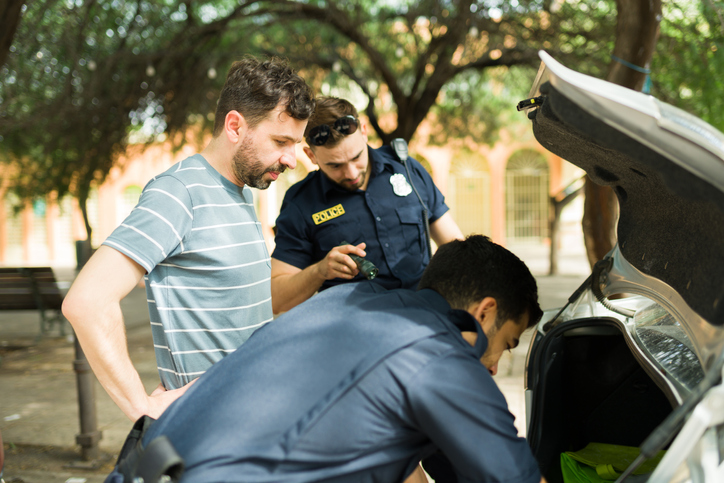

Which parts of the vehicle can the police search?
(December 28, 2022) In a previous post, we discussed search and seizure laws pertaining to automobiles. We saw how a warrantless vehicle search must meet two requirements: probable cause and mobility. But how much of the vehicle can police officers search under this rule? If they see evidence of illegal contraband (illegal substances, for example), do they have the ability to search the entire vehicle? What about bags or locked containers in the passenger compartment or trunk? Let’s take a look at what’s covered under the mobile conveyance exception – and what is not.
If a police officer sees an illegal substance in the passage compartment of a vehicle, does that justify a search of the trunk? Well, like many other aspects of a warrantless search, it depends. In the Supreme Court case United States v. Ross, the precedent was established that the only aspect of a warrantless search that was no longer required was the warrant itself. Every other rule regarding a lawful search still applies. Therefore, it was determined that if an officer has probable cause and the vehicle is readily mobile, then he is justified to search every part of the vehicle that may conceal the contents of the search. So, an officer can search your trunk without a warrant, but only if it’s reasonable to assume that the illegal contraband they are searching for could be concealed in the trunk.
The rule that allows the officer to search any part of the vehicle where the contraband could be reasonably found also applies to locked or open containers inside the vehicle. However, the same guidelines apply – it has to be reasonable that an officer could find the contraband within the container. Conversely, if the officer has probable cause to believe contraband is concealed within a container, locked or otherwise, this does not justify a full-vehicle search.
In this hypothetical scenario, a technology store is recently robbed of several large televisions, and the police receive a tip about the thieves fleeing the scene with the stolen property in a vehicle matching your vehicle’s description. In a traffic stop, the police pull you over and claim probable cause to search your vehicle for the stolen televisions. When they don’t find them in the trunk of the vehicle, they search the passenger compartment and then the glove compartment. In the glove compartment, they find illegal contraband, and you are arrested. In this scenario, the search of the glove compartment was not covered by the mobile conveyance exception – it is unreasonable to assume that a television could fit in the glove compartment. Therefore, this search was illegal, and the evidence obtained from it would most likely not be admissible in court. Most police officers are honest and seek to uphold the law. However, there are some who are not, and this can lead to a violation of your constitutional rights. If you believe that a search of your vehicle was conducted illegally, contact the legal team at Carabin Shaw as soon as possible.
The Law Office of Carabin Shaw has been representing the people of San Antonio and across Texas for 30 years. If you believe your rights have been violated by an illegal search and seizure, contact Carabin Shaw for a free consultation today at 800-862-1260.